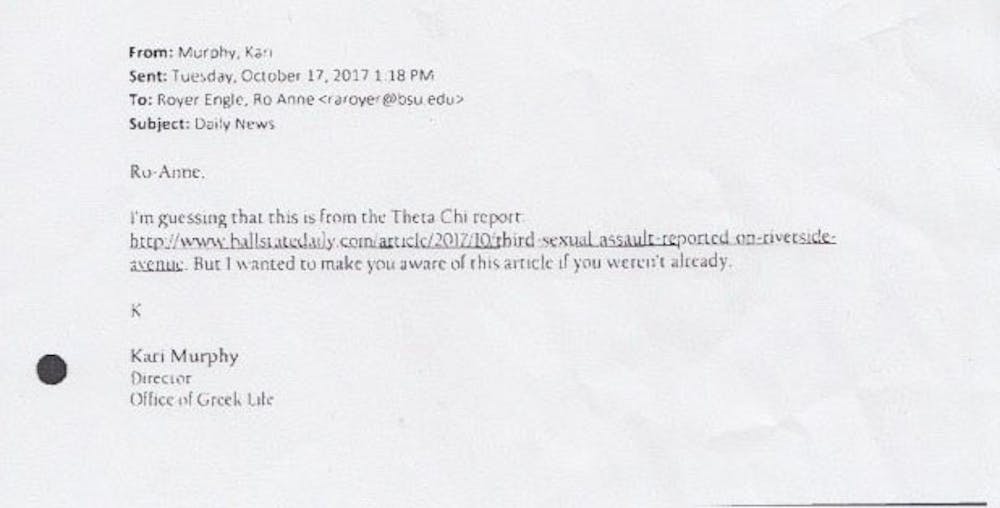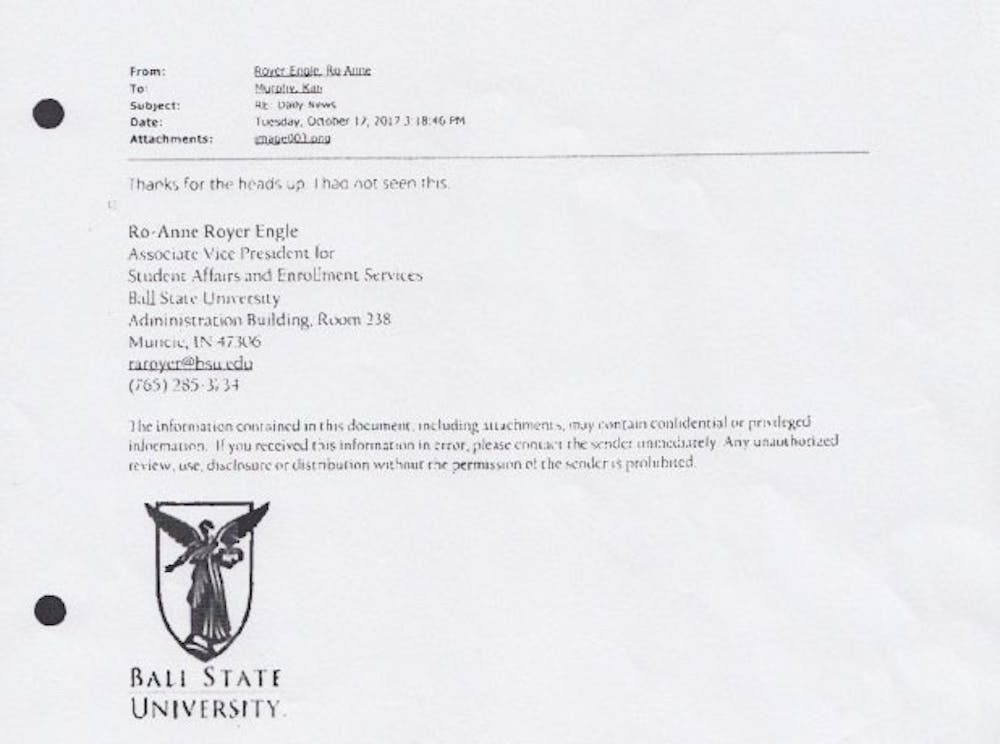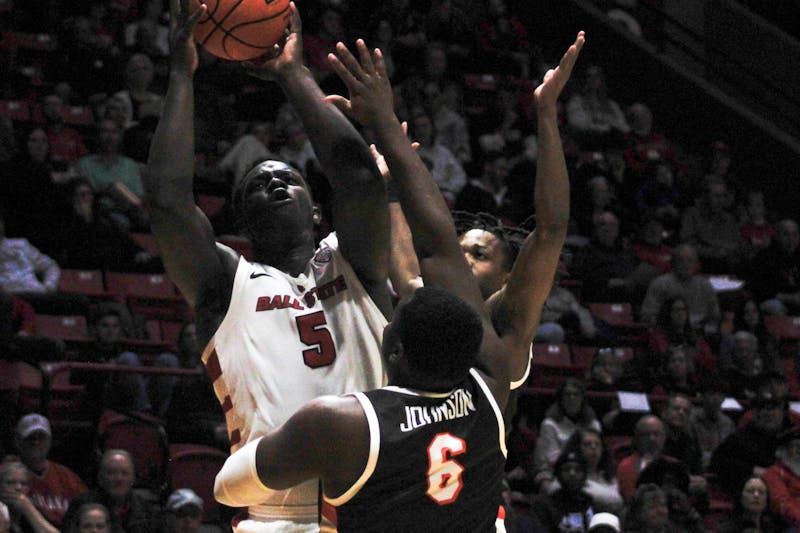Ball State’s Theta Chi Fraternity was disbanded Wednesday morning after the organization’s national board of directors revoked the charter of the Ball State Delta Kappa chapter.
The decision to close the chapter, which was made by the fraternity’s national board of directors, was due to confirmed violations of Theta Chi’s policies, according to a statement released by the national chapter. A spokesperson for the national chapter would not specify what those violations were.
As a result of Theta Chi’s revocation, the university withdrew its recognition of the chapter and the chapter is no longer listed on the Ball State website as of Wednesday morning. Kathy Wolf, vice president for marketing and communications, said members living in the Riverside Avenue Theta Chi house can no longer live there. Additionally, the fraternity can no longer host events or gatherings.
As of spring 2018, there were 95 active members in Theta Chi’s Delta Kappa chapter, according to the Spring 2018 Greek Life report. Theta Chi was listed as an alcohol-free chapter house.
Wolf said Theta Chi members living in the house will have to make other housing arrangements, but the university is helping with those efforts. All members must be moved out of the house by mid-October, but a specific date has not been made public.
According to the Theta Chi bylaws under section four, the Grand Chapter, or the Theta Chi board of directors, can revoke the charter of any of its 239 chapters by a three-fourths vote.
The bylaws state, “revocation can occur if a chapter repeatedly violates or fails to comply with applicable laws, the bylaws or the terms of a probation or suspension the chapter may have, or, if conditions or circumstances prevents the viable operation of the chapter.”
Once the the charter is revoked, the chapter will then be considered inactive.
However, the bylaws say the revocation of a charter can be appealed at the next International Convention, a gathering of Theta Chi members and alumni held every year, typically in the summer. The chapter would need a three-fourths vote from the Grand Chapter to sustain the appeal.
IFC pause
This is not the first time a fraternity has been shut down or disbanded from the university. In 2004, Lambda Chi Alpha was shut down following an April 3 party where 87 people were ticketed for minor consumption, according to a previous Daily News article.
The fraternity was first sent a letter notifying it of a temporary suspension and its charter was later removed. However, the fraternity officially regained its charter and came back to the campus in 2010.
While the national chapter wouldn’t specify what behaviors led to this decision, when the Interfraternity Council fraternities — which Theta Chi was formerly a part of — were put on a social “pause” Oct. 24, 2017, it was due to a “trend or pattern” of behavior that is “unacceptable to the university,” Wolf said.
RELATED: Ball State, 13 fraternities agree to 'pause' all social events
According to university police crime logs from that time, there were reports of three sexual assaults, two illegal possessions of alcohol, one battery, two thefts and three criminal mischiefs from the 800 block to the 1100 block of W. Riverside Ave., which is home to seven of Ball State's fraternity houses and a few other residences.
Since the start of the 2018 fall semester, there have been three reported sexual assaults, one of them occurring on the 1100 block of West Riverside Avenue in mid-August.
In an Oct. 17, 2017, email that was obtained through a Daily News records request between director of Greek Life Kari Murphy and associate vice president for student affairs and enrollment services Ro Anne Royer Engle, Murphy speculates that one of the sexual assaults reported was at the Theta Chi house. The email states:
"Ro-Anne: I'm guessing this is from the Theta Chi report: http://www.ballstatedaily.com/article/2017/10/third-sexual-assault-reported-on-riverside-avenue. But I wanted to make you aware of this article if you weren't already. K"


When The Daily News reporters asked Murphy for a comment Wednesday morning, they were instead directed to Wolf. Wolf, who was contacted over the phone and through email, declined to comment on the email.
Lawsuit
In addition to the criminal occurences in the area, a lawsuit was filed by a Theta Chi member against another.
On June 12, 2018, James Bolt filed a lawsuit requesting James Katona give compensation for his “medical expenses, pain and suffering, loss of wages, future medical expenses, future pain and suffering and for all other relief just and proper in the premises,” after a slap resulted in injury and medical expenses, according to the lawsuit.
The lawsuit stated members of Theta Chi “frequently would greet each other by slapping each other on the face in a playful manner with an open hand and with light force,” an action that was never “discouraged or disallowed” by the Ball State fraternity.
When Katona slapped Bolt, the lawsuit said Katona had previously been “consuming alcoholic beverages” and caused Bolt “pain and suffering.”
A default judgment in favor of Bolt was entered Sept. 4, 2018, however a hearing to determine the amount of damages owed has not yet been held.
Moving Forward
Because Theta Chi was investigated by the national chapter and not the university, the IFC was not involved in the investigation process, said IFC president Justin Concannon, though it did know an investigation was being held.
The disbandment of the chapter means the IFC has gone from a 13-fraternity council to 12 and has lost the funds from Theta Chi’s dues. However, Concannon said there are still some positives that can come from this decision.
“Obviously, it’s disheartening to lose a chapter of one of the member chapters of the council,” he said. “But, it also shows the accountability systems that they have here for fraternities at Ball State are up and working successfully. It kind of sets a precedent to other chapters that obviously, risk management and them holding themselves accountable is obviously very important to maintain your status as a fraternity on this campus.”
Because Theta Chi is a member of the National Interfraternity Council (NIC), members cannot join a different fraternity unless it is outside of the NIC. Ball State currently has 10 NIC fraternities and two that are not, Concannon said.
Concannon said being in Greek Life affords a lot of opportunities to both the community and to those involved.
“Benefits Greek Life brings to Ball State and Muncie are that participation at other events such as Dance Marathon and athletic events are greatly increased because of our organizations,” he said. “The benefits to the individual member is a huge amount of personal development and growth, along with the opportunity to make lifelong friendships.”
While Concannon said it is difficult to lose a fraternity, he doesn’t see it changing IFC operations too much. In Spring 2018, the IFC donated a total of 5,280 service hours and $53,268.13 to their philanthropies, according to the Spring 2018 Greek Life report.
“Going forward, from the IFC point of view, I don’t see us changing a whole lot. I can see us kind of rallying together and the unity between chapters becoming stronger from this happening,” he said. “But I don’t see the operations changing for the other chapters that are currently doing good things on this campus.”
Andrew Harp and Brooke Kemp contributed to this story.
Contact Brynn Mechem with comments at bamechem@bsu.edu or on Twitter @BrynnMechem.





The Daily News welcomes thoughtful discussion on all of our stories, but please keep comments civil and on-topic. Read our full guidelines here.